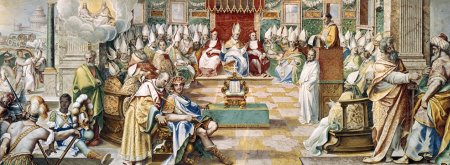The Gospels and the 'so-called' gospels
[Although the topics of this interview were initiated by Dan Brown's book The Da Vinci Code, the discussion gives clear responses to many questions that are often asked concerning Christian beliefs about the divinity of Jesus and why the New Testament did not include other 'gospels'. The interview was originally published as The Da Vinci Code is Cracked, in two parts, which have been combined here. Ed.]
Richard Burridge, the Dean of King's College London, talks to Nigel Bovey about The Da Vinci Code and the Bible.
Nigel Bovey: Dr Burridge, what is your overriding impression of The Da Vinci Code?
Richard Burridge: Firstly, it is a cracking good read, a real page-turner. One of its appeals is that we all like secrets. We suspect that 'they' are keeping something from us – that there's a conspiracy of silence. The book also taps into a spiritual thirst. From the musical Godspell of the 1970s to last year's The Passion of the Christ, people are fascinated by Jesus. Who is he? The book is seductive in that it promises hidden secrets to those in the know. And we all want to be in the know.
The central plot of the book is that the two main characters go hunting for the Holy Grail, having decoded secret messages found in Leonardo da Vinci's painting The Last Supper. They make inquiries at King's – "renowned for its electronic theological database". Are you happy with the college's inclusion?
Dan Brown makes a number of statements about King's College which contradict his opening statement about accuracy. He has his two main characters catching a Tube at Temple station to travel to King's, whereas Temple is the station nearest to King's. He locates King's next to the Houses of Parliament, when it is on the Strand. He places our Research Institute in Systematic Theology (which is part of our Department of Theology and Religious Studies) in a magnificent on-campus library with "one of the most complete and electronically advanced religious research libraries in the world", complete with a tea-serving librarian and fellows conducting biblical research.
if Dan Brown can't be trusted on matters of fact, can he be trusted on matters of faith?
Our Research Institute and Theology Department are world-renowned but the rest is a figment of his imagination. As with so much of what follows, Brown is plausible but wrong. He may have visited the college website but I doubt he has ever visited King's or, indeed, London.
This lack of accurate research – especially in light of his accuracy claim – poses a fundamental question: if Brown can't be trusted on matters of fact, can he be trusted on matters of faith?
The leading academic in the story claims that rather than just the four Gospels, there were thousands of records of the life of Jesus in existence. He also says that more than 80 gospels were considered for the New Testament and that Matthew, Mark, Luke and John were included to suppress the truth. As a Gospels specialist how accurate would you say this is?
This shows a complete misunderstanding of what actually happened. During the first generation after Jesus' life, death and resurrection lots of stories and teachings of Jesus circulated in oral form – people talked about Jesus and passed them on to one another. There were also living witnesses – the apostles, disciples' wives, lots of people who had seen Jesus. They may have had a collection of Jesus' teachings that were written down in a document scholars call 'Q'.
The first written accounts of Jesus' life appeared a generation or two later. As one would expect, this was around the time the eyewitnesses were getting old or were being killed in persecutions. Most biblical scholars agree that, because of its rough-and-ready style, Mark was the first Gospel to be written and they date it in the AD 60s, during the period of the persecutions under the Roman Emperor Nero. So we are talking only about 30 years after Jesus' death. New Testament scholars say that Matthew, Luke and John belong in the period between the two Jewish wars, AD 70-132, with the overwhelming majority placing them in the 80s or 90s. It is very unlikely, then, that there were thousands of different documents chronicling the life of Jesus.
'Q' sounds like something from a James Bond novel. Is it a code name or another code?
'Q' is scholars' shorthand for the German word quelle, or 'source'. What we mean is that some parts of Matthew and Luke are so similar that they suggest the writers had access to a common source (in the same way that students might access the same references for an essay). 'Q' is a collection of the sayings of Jesus. There is nothing about his life story. We don't know whether 'Q' existed as a written document or whether it was transmitted solely by word of mouth. Brown suggests that Jesus may have written 'Q'. He most certainly did not.
Dan Brown quotes from the gospels of Mary Magdalene and of Philip. What kind of writings are these and why aren't they in the New Testament?
In December 1945 an Arab peasant Mohammed Ali discovered some ancient manuscripts buried in the sands of Nag Hammadi, Egypt. Fifty-two survive, including the gospels of Mary, Thomas, Philip and various other secret texts.
Most of these are accounts of Jesus after his resurrection, with lots of new supposed revelations and teachings. They were written in the 2nd and 3rd centuries and reflect a belief in secret knowledge as the way to salvation. They are referred to as the Gnostic gospels, coming from the Greek word gnosis – 'knowledge'.
They were not included in the New Testament or mainstream Christianity because they represented a wider belief system that was incompatible with the teachings of Jesus and with traditional Jewish teaching as outlined in the Old Testament.
The Gospel of Thomas is a collection of 114 purported sayings of Jesus. Some of them are very similar to sayings in Matthew, Mark and Luke; many are wild and wacky and out of keeping with what we know of Jesus. Like other Gnostic literature it is reckoned to have been written some 100 years after the New Testament Gospels and tells us nothing about Jesus.
So, wanting to give the reader secret insight is something Gnostic literature and The Da Vinci Code have in common?
The New Testament Gospels have silences. What, for instance, was Jesus like as a boy? What did he do between praying in the Temple at 12 and being baptised in the River Jordan at around 30? What did Jesus do in the 40 days after the Resurrection? These are valid enough questions and provide fertile ground for imagination and speculation.
Silence is always grist to the mill for conspiracy theorists
The cornerstone of The Da Vinci Code is that Jesus was only human, married Mary Magdalene and fathered a daughter with her. Part of the Gnostic writings known as the infancy gospels, such as the Infancy Gospel of Thomas, with its stories of the young Jesus killing a boy while playing, lengthening a piece of wood in a carpentry shop and making clay sparrows fly, are just as fanciful. They are myths and legends. Silence is always grist to the mill for conspiracy theorists.
Brown's academic claims that, in an attempt to exert power, Emperor Constantine commissioned a new Bible which played down Jesus' humanity and boosted claims of his divinity. Is that the way it happened?
It's a great conspiracy theory to say that Constantine had a beauty contest of 80 or so gospels and decided to give one or two some cosmetic surgery to suppress the truth. But the facts simply do not bear that out. Constantine did call the first great Church council, the Council of Nicaea in 325, but the discussions were about the nature of Jesus, not a new Bible.
A number of gospels were circulating during this period. Just as people recommend helpful books to each other today, that's what happened then. As one who believes that Scripture is divinely inspired, I'm not surprised that people found that Matthew, Mark, Luke and John contained the word of life. People's lives were changed when they read these books and they gained acceptance as authoritative.
As early as the 2nd century, bishops and Church Fathers were referring to other books as the "so-called Gospel of…". By AD 150, Matthew, Mark, Luke and John were the four that were accepted by the widest number of early Christian communities, and they were being put together as the four-fold Gospel.
Is the Bible, as The Da Vinci Code puts it, the "product of man, not of God"?
Very few Christians believe that divine inspiration means verbal dictation. Muslims believe Allah dictated the Koran to Mohammed. Mormons believe the Book of Mormon was copied from golden plates sent from God. People who practise the occult believe in spirit writing, when someone is taken over by a spirit and writes or draws through channelling.
But the Christian understanding of God is that he respects human freedom so he wouldn't take over a person. The best place to look for biblical inspiration is the Bible. In 2 Peter 1:20-21 it says we "must understand this, that no prophecy of Scripture is a matter of one's own interpretation, because no prophecy ever came by the impulse of man, but men moved by the Holy Spirit spoke from God" (Revised Standard Version).
In 2 Timothy 3:16 we have the word 'inspired' – "All scripture is inspired by God ...". 'Inspired' comes from the Latin inspirare, 'to breathe into'. The Bible itself makes it clear that it is a human production and breathed through by God. Few Christians believe the Bible was dictated. No Christian believes the Bible is simply a human product. All Christians think it is a matter of human beings being inspired by God to write it.
There is another side to inspiration. And that is, what does it do for the reader? It is through the inspiration of the Holy Spirit that, when we read the Bible, God speaks to us.
it is the original Gospels of Matthew, Mark, Luke and John that still change people's lives today
I, along with many others, have known the words of the Gospels to leap out of the page and hit me between the eyes. Why are Matthew, Mark, Luke and John in the Bible and other gospels aren't? Simple – they have power, the others don't. When people take Jesus up on his promise, "Come to me all who labour and are heavy-laden, and I will give you rest" (Matthew 11:28), they find that it works! The amazing thing, the miracle if you like, is that it is the original Gospels of Matthew, Mark, Luke and John, those that contain the real account of the historical Jesus – that still change people's lives today.
To the casual reader, the theology of The Da Vinci Code might seem as reasonable – credible, even – as the Bible's. Is The Da Vinci Code a threat to the Christian faith? Is it a barrier to belief in Jesus? It is persuasively written but it is most definitely not a credible threat to the Gospels. They are far more accurate and authoritative. It is, however, a marvellous opportunity to talk with people about Jesus. And a great reason for people to read the Gospels and find out who Jesus really is.
On a number of occasions, characters in The Da Vinci Code attack the essential Christian belief that Jesus is the Son of God. The academic Teabing claims that until a narrow vote in the Council of Nicaea in AD325 'Jesus was viewed by his followers as a mortal prophet, a great and powerful man, but a man nevertheless', and that it was only subsequent to this vote that the Church decided Jesus was divine. Is this true?
As with other aspects of his book – including what he writes about King's College – Dan Brown writes a half-truth, then twists it to make it more interesting. Yes, there was the Council of Nicaea in 325, which produced a draft of what we know as the Nicene Creed, confirming a number of issues about Jesus' divinity which were under debate at the time.
It is just plain wrong to say that the divinity of Jesus was settled by a vote in the 4th (or 5th) century
The council, however, did not finalise the debate. It took the Council of Constantinople in 381 to produce a final version of the Nicene Creed, which is technically known as the Nicene-Constantinopolitan Creed.
The Constantinople Council focused on who Jesus is in relation to God, including the doctrine of the Trinity. It was the Council of Chalcedon in 451 that formalised who Jesus is in relation to us – his humanity and his divinity.
It is just plain wrong to say that the divinity of Jesus was settled by a vote in the 4th (or 5th) century, although, of course, its suits conspiracy theorists like Brown to put it in these terms.
So, what is the evidence in the New Testament for the divinity of Jesus?
Mark's Gospel was written around AD 60, Matthew and Luke around AD 80 and John's around AD 90-100. They all show a belief in the humanity and divinity of Jesus. Remarkably, the writers – Jewish believers who had been brought up on belief in one God – use language that is appropriate to God to describe a human being who lived and died among them less than a generation earlier.
Some of the most explicit statements about the divinity of Christ come in the writings of Paul which, written in the 50s and 60s, are even earlier than the Gospels.
When Paul talks about the 'God and Father of our Lord Jesus Christ', for the word 'Lord' he uses the Hebrew word Adonai, a word in Jewish thinking (and remember Paul was a man who knew the scriptures well) which was only allowed to be used of God.
He talks about Jesus in the same terms he talks about God. He is careful to distinguish between God the Father, Jesus and the Spirit.
Paul talks about Jesus in the same terms he talks about God
In his Letter to the Philippians, he describes Jesus as having the nature of God, yet emptying himself and taking on human form. Jesus humbles himself to death on a cross, returns to God and is exalted.
This is stunning. This is written in the 50s, within two decades of that very person being nailed to a cross in Jerusalem. It is complete nonsense to say that Christians didn't believe Jesus was the Son of God until the 4th century. It is clearly there in the New Testament.
What is the trinity about?
The doctrine of the trinity – the belief that God is three persons in one – is an absolute mind-boggler. It was not conceived by a bunch of people sitting down with the Emperor Constantine to impose something on or to paganise the Church. It is an attempt to put into faltering human words what is at the core of the Christian experience.
The early believers were Jewish monotheists who had been brought up to believe, know, love and trust God the Creator. They found this same God coming to them through this human being who was walking among them – Jesus of Nazareth. They found him doing and saying things that only God could do and say. It is such a staggering idea that you grope after words to describe it.
The doctrine of the trinity is an attempt to put into faltering human words what is at the core of the Christian experience
After his death they found Jesus was alive again, then he ascended to heaven. But, although he wasn't physically present, there was a presence in their worship that was inspiring them. The same person who was the Creator-God, the person of Jesus, is now with them in their worship and they can only call that person the Spirit of God.
And so this idea of the Father, the Son and the Spirit is first experienced by Christians in their lives and worship.
The difficulty comes when you try to describe an experience like that. Paul doesn't attempt to write a theology of the trinity, he just talks of his experience of God the Father, of being forgiven and restored by Jesus Christ the Son and of being filled, empowered and inspired by the Spirit of God.
It is only in later centuries that theologians translate the experience into the theology and into a form of words – a creed – which summarises those beliefs. Many of the arguments, then and now, revolve around how Jesus can be truly divine and truly human. Mormons and Jehovah's Witnesses, for example, differ from Christianity in their beliefs about the extent to which Jesus is, at one and the same time, fully human and fully divine.
One of the problems the ancients had was in believing Jesus was truly human. How could God, who is by definition above the physical world with its failings and corruption, enter the sheer messiness of the physical creation? Some got round this by saying that Jesus was just a spectre or a demigod.
The problem people have today isn't the humanity of Jesus but his divinity. They see him as a great teacher, a good man, a miracle-worker, a prophet – but not the unique Son of God.
The crux of The Da Vinci Code is that a very human Jesus married Mary Magdalene and had a daughter by her, thus establishing a bloodline that exists today. Was Jesus married?
The texts neither say that he was, nor that he wasn't. I suppose it is possible that Jesus was married and his wife died before he started his ministry. Most rabbis were married. Therefore, it would have been the expectation that Jesus would marry. It is not a question in the New Testament.
Would it have been unusual for Jesus to be unmarried in the Jewish society of his time?
We know that his human father, Joseph, was alive when he was a baby and appears not to be alive by the time Jesus starts his ministry. We can reasonably deduce that Joseph died in the intervening years, leaving a young wife Mary with Jesus and their own natural children.
It was the father's responsibility to find a wife for his son and the first-born son was the first to be married. If Joseph died in Jesus' childhood or in his early teens that might explain why Jesus was not found a wife in the normal course of events.
Following Joseph's death it would have been Jesus' responsibility as eldest son to find spouses for his brothers and sisters. He would have had to do that before he could think about being selfish and finding somebody for himself.
If this is what he did, and it is pure speculation, then this may explain why he didn't begin his ministry until he was about 30, by which time he had bigger things on his mind.
Would it make any difference to the nature of Jesus if he had been married?
No. Jesus is fully human. People who have not been married are fully human. I think Jesus wasn't married and he didn't have children. The incarnation – the idea that he became human – does not mean that he had to experience every human state. That would have been as impossible for him as it is for us.
His mother Mary is mentioned in Acts, his brother James is mentioned in 1 Corinthians and wrote the Letter of James. These are part of his physical family. If he had a wife or children they would surely have been mentioned as well.
What does the Bible say about Mary Magdalene?
Luke's Gospel (in Luke 8:2) records that Jesus cast seven devils out of Mary. Over the years people have thought she was a prostitute, but it doesn't say so in the Bible.
She is clearly close to the inner circle of Jesus and goes around with him on his preaching tours. Luke lists her next after the 12 disciples.
The more vital issue, for me, is how we can become children of God spiritually through a personal faith in Jesus Christ
Mary watched the crucifixion. She saw the tomb where Jesus was laid and all four Gospels mention her as the first witness of the resurrection. Considering that in those days a woman's testimony was not accepted in a court of law, that's remarkable.
The Bible tells us very little about what Jesus did between the resurrection and his ascension. This has opened the doors to fantasists and speculators. One theory goes that, after the crucifixion, the cool of the tomb revived Jesus, who rolled the stone aside, married Mary Magdalene and went to India. Another one is that Jesus divorced Mary and married a rich merchant woman, Lydia. Complete nonsense!
Because she was the first to witness the resurrection, some of the Gnostic writings (written later than the Gospels and contrary to Christian teaching) use Mary as an imaginary mouthpiece for the resurrected Christ.
In the Gospel of Mary Magdalene, for example, it is Mary who comforts the distraught disciples after the crucifixion, not Jesus. It is here the claim is made that Jesus loved her more than the other disciples, which Dan Brown quotes in The Da Vinci Code, along with a verse from the equally erroneous Gospel of Philip which says Jesus used to 'kiss her often on the mouth'.
If The Da Vinci Code is based on half-truth and speculation, why is it so popular?
Human beings are curious animals. We want to be in the know. We hate being kept in the dark. We like to know secrets. The Da Vinci Code appeals to that part of us, as well as to the spiritual part which for many people is not expressed or nourished through traditional Christianity.
Dan Brown spends a lot of time weaving a story about the physical children of Jesus. The more vital issue, for me, is how we can become children of God spiritually through a personal faith in Jesus Christ.
© 2011 The Salvation Army



